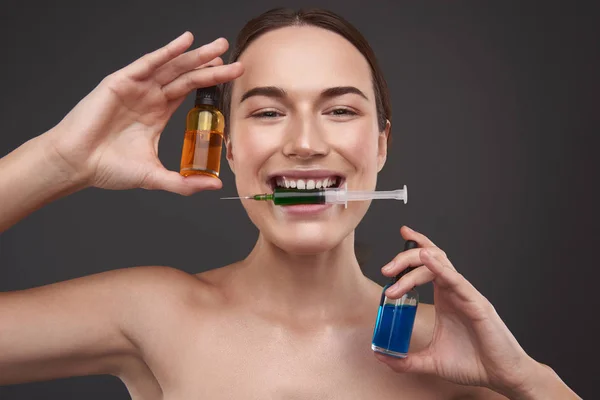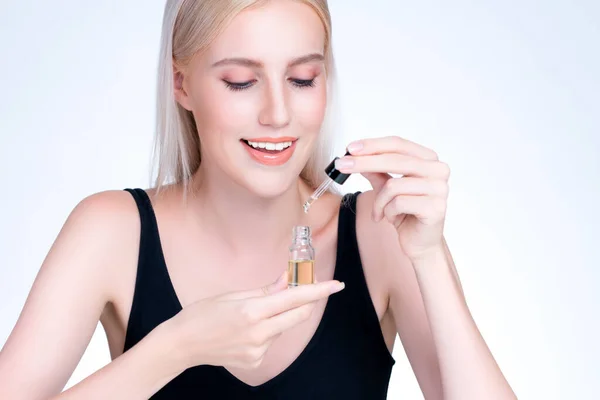What Are Peptides In Skincare: Peptides are short chains of amino acids that act as building blocks of proteins like collagen and elastin in the skin, playing a crucial role in maintaining skin’s firmness and elasticity, thus making them a popular ingredient in anti-aging products.
Imagine unlocking the secret to youthful, radiant skin with just a few potent molecules. Enter Peptides the unsung heroes of modern skincare. These tiny yet powerful proteins are revolutionizing the beauty industry, promising to smooth wrinkles, boost collagen, and restore your skin’s natural glow.
As the skincare world buzzes with excitement, let’s delve into what peptides are and why they might be the ultimate game-changer for your complexion.

What Are Peptides In Skincare
Peptides in skincare are short chains of amino acids that play a crucial role in maintaining skin health. These tiny molecules signal skin cells to perform specific functions like collagen production, which is essential for youthful, firm skin. Peptides are often described as the building blocks of proteins such as collagen, elastin, and keratin.
They can help reduce the appearance of fine lines, wrinkles, and improve skin texture and tone. Incorporating peptides into your skincare routine can result in visibly smoother, firmer, and more radiant skin.
Benefits of Peptides in Skincare
Peptides are renowned for their anti-aging properties. As we age, our natural collagen production declines, leading to sagging skin and wrinkles. Peptides stimulate collagen synthesis, helping to restore skin’s elasticity and firmness. This makes them a popular ingredient in anti-aging creams and serums.
Peptides also help to repair the skin barrier, improving hydration and protecting against environmental damage. They can reduce inflammation, which is beneficial for sensitive and acne-prone skin, and promote wound healing, making the skin look healthier and more resilient.
Types of Peptides in Skincare
There are several types of peptides used in skincare, each serving unique functions. Signal peptides encourage the skin to produce more collagen, elastin, and other proteins. Carrier peptides deliver trace elements necessary for wound healing and enzymatic processes.
Enzyme inhibitor peptides slow down the natural breakdown of collagen, maintaining skin’s structure for longer periods. Neurotransmitter inhibitor peptides relax facial muscles, similar to Botox, reducing the appearance of fine lines and wrinkles. Each type contributes to a comprehensive approach to skin rejuvenation.
How to Use Peptides in Your Skincare Routine
Incorporating peptides into your skincare routine can maximize their benefits. Start with a peptide-infused serum or moisturizer, applying it to clean, dry skin. For best results, use products that combine peptides with other active ingredients like hyaluronic acid, antioxidants, and vitamins.
Consistency is key; use peptide products daily, preferably in both morning and evening routines. Pairing peptides with a good sunscreen will protect the skin from UV damage, enhancing the overall effectiveness of your skincare regimen.
Remember to be patient, as it can take several weeks to notice significant improvements in your skin’s appearance.

The Science of Peptides
Peptide Structure and Formation
Amino Acids and Peptide Bonds
Peptides are short chains of amino acids linked by peptide bonds. Amino acids, the building blocks of peptides and proteins, connect through a dehydration synthesis reaction, forming a covalent bond known as a peptide bond. This bond is crucial for the structural integrity and function of peptides.
Types of Peptides
Peptides vary in length and complexity. Dipeptides consist of two amino acids, while tripeptides are composed of three. Oligopeptides typically contain between 4 and 20 amino acids. Polypeptides, which are longer chains, can form complex protein structures. Understanding these types helps in comprehending their diverse biological roles.
Natural Occurrence in the Body
Role in Protein Synthesis
Peptides play a vital role in protein synthesis. Ribosomes translate genetic information into peptide chains, which fold into functional proteins. This process is fundamental to cellular function and growth. Proper protein synthesis is essential for maintaining healthy tissues and organs.
Functions in Cell Signaling and Repair
In addition to protein synthesis, peptides are crucial in cell signaling and repair. They act as hormones and neurotransmitters, facilitating communication between cells. Peptides like insulin regulate blood sugar levels, while others promote healing and tissue regeneration. Their signaling capabilities are essential for maintaining homeostasis.
Synthetic Peptides in Skincare
Laboratory Synthesis
Synthetic peptides are created in laboratories using advanced techniques. These lab-made peptides mimic natural peptides but are designed to enhance stability and efficacy. Laboratory synthesis allows for the production of peptides tailored for specific skincare needs, such as anti-aging and hydration.
Differences from Natural Peptides
Synthetic peptides differ from natural peptides in their stability and targeted action. While natural peptides can degrade quickly, synthetic variants are engineered for longevity and potency. This makes them particularly effective in skincare formulations, offering benefits like collagen production, wrinkle reduction, and improved skin texture.
Understanding peptides, from their basic structure to their application in skincare, highlights their importance in both biological processes and innovative cosmetic solutions. Peptides are indispensable in promoting health, beauty, and cellular function.
Types of Peptides Used in Skincare
Peptides are short chains of amino acids that play a vital role in skincare by promoting various skin benefits. Here, we explore different types of peptides commonly used in skincare products.
Signal Peptides
Signal peptides help communicate with skin cells to produce more collagen and elastin. These proteins are essential for maintaining skin’s firmness and elasticity. Signal peptides effectively reduce the appearance of fine lines and wrinkles, making the skin look younger and healthier.
Examples
A well-known signal peptide is Palmitoyl Pentapeptide-4. This peptide stimulates collagen production, enhancing skin texture and resilience. It’s a popular ingredient in anti-aging creams and serums.
Carrier Peptides
Carrier peptides transport essential trace elements like copper and manganese to the skin. These elements are crucial for wound healing and enzymatic processes. By delivering these minerals, carrier peptides aid in skin repair and rejuvenation.
Examples
Copper peptides, such as GHK-Cu, are famous carrier peptides. They promote skin healing, boost collagen and elastin production, and have anti-inflammatory properties. These peptides are often found in products designed to improve skin firmness and reduce scars.
Enzyme Inhibitor Peptides
Enzyme inhibitor peptides work by blocking enzymes that break down collagen and elastin. By inhibiting these enzymes, these peptides help maintain the skin’s structural integrity, keeping it firm and smooth.
Examples
Matrixyl 3000 is a popular enzyme inhibitor peptide. It contains two peptides, Palmitoyl Tripeptide-1 and Palmitoyl Tetrapeptide-7, which work together to combat collagen degradation. This peptide complex is widely used in anti-aging formulations to reduce wrinkles and improve skin elasticity.
Neurotransmitter Inhibitor Peptides
Neurotransmitter inhibitor peptides reduce muscle contractions that lead to expression lines, such as crow’s feet and frown lines. They work similarly to botulinum toxin (Botox) but are less invasive.
Examples
Argireline, also known as Acetyl Hexapeptide-8, is a well-known neurotransmitter inhibitor peptide. It helps relax facial muscles, minimizing the depth of wrinkles and fine lines. Argireline is a common ingredient in anti-wrinkle creams and serums.

Mechanisms of Action in Skincare
Collagen Production
Stimulation of Collagen Synthesis
Effective skincare products boost collagen production, leading to firmer and more youthful skin. Ingredients like retinoids and peptides are commonly praised for their ability to stimulate collagen synthesis, which helps reduce wrinkles and fine lines.
Reduction of Collagen Breakdown
Protecting existing collagen is essential for maintaining skin elasticity. Antioxidants like vitamin C and green tea extract are frequently highlighted for their role in reducing collagen breakdown, preserving the skin’s structure and appearance.
Skin Barrier Function
Enhancement of Skin Barrier Integrity
A strong skin barrier is crucial for healthy skin. Ceramides and fatty acids are popular for their ability to enhance skin barrier integrity, preventing irritation and sensitivity.
Prevention of Moisture Loss
Hydrated skin looks plumper and more radiant. Hyaluronic acid and glycerin are well-known for their effectiveness in preventing moisture loss by attracting and retaining water within the skin layers.
Anti-inflammatory Properties
Reduction of Skin Inflammation
Inflammation can lead to redness and discomfort. Ingredients like niacinamide and aloe vera are celebrated for their anti-inflammatory properties, helping to reduce skin inflammation and promote a calmer complexion.
Calming Effects on Irritated Skin
Soothing irritated skin is key to maintaining a healthy appearance. Chamomile and colloidal oatmeal are often recommended for their calming effects on irritated skin, providing relief and comfort.
Antioxidant Properties
Neutralization of Free Radicals
Free radicals cause premature aging and skin damage. Antioxidants such as vitamin E and coenzyme Q10 are widely used to neutralize free radicals, protecting the skin from oxidative stress.
Protection Against Environmental Damage
Daily exposure to pollution and UV rays harms the skin. Skincare ingredients like resveratrol and ferulic acid are effective in providing protection against environmental damage, ensuring the skin remains healthy and vibrant.
Incorporating these mechanisms into your skincare routine can lead to noticeable improvements in skin health and appearance. Using products that address collagen production, skin barrier function, anti-inflammatory, and antioxidant properties can transform your skincare regimen.
Benefits of Peptides in Skincare
Peptides offer numerous benefits in skincare, particularly in anti-aging. Reduction of fine lines and wrinkles is a notable effect, as peptides stimulate collagen production, which helps smooth out the skin. People often describe this as achieving a “youthful glow” and “smoother skin.” Improvement in skin firmness and elasticity is another key advantage.
Peptides enhance the skin’s structural integrity, making it appear firmer and more elastic. This results in a “lifted” and “toned” appearance, which is highly sought after in anti-aging products.
When it comes to skin hydration, peptides play a crucial role in moisture retention. They strengthen the skin barrier, preventing moisture loss and keeping the skin hydrated. Users frequently refer to this as “deep hydration” and “lasting moisture.”
Enhanced skin smoothness is also a benefit, as well-hydrated skin feels softer and smoother to the touch, contributing to an overall “radiant” and “supple” complexion.
Peptides are also beneficial for healing and repair. They aid in the acceleration of wound healing by promoting cell regeneration and reducing inflammation. This leads to faster recovery times and is often described as “soothing” and “restorative.” Additionally, peptides help in the reduction of scarring by facilitating proper tissue repair, resulting in “clearer” and “even-toned” skin.
For overall skin health, peptides improve skin texture by promoting cell turnover and collagen synthesis. This results in “refined” and “smoother” skin. Furthermore, peptides contribute to a brighter complexion by reducing pigmentation and enhancing skin clarity. This effect is often described as achieving a “luminous” and “radiant” look.
In summary, peptides in skincare provide comprehensive benefits, from anti-aging and hydration to healing and overall skin health, making them a popular choice for achieving “youthful,” “hydrated,” and “radiant” skin.
Application and Usage
Product Types Containing Peptides
Serums
Peptide serums are highly concentrated formulations designed to deliver powerful anti-aging benefits. They help boost collagen production, improving skin firmness and reducing fine lines. Users often describe them as lightweight and fast-absorbing, making them ideal for layering under other skincare products.
Moisturizers
Peptide moisturizers provide hydration while enhancing skin elasticity. These products often combine peptides with hyaluronic acid and ceramides for added moisture retention. Described as rich and nourishing, they are perfect for daily use to maintain a youthful complexion.
Eye Creams
Peptide eye creams target delicate under-eye areas, reducing puffiness, dark circles, and crow’s feet. Commonly noted for their gentle formulation, these creams are essential for those looking to rejuvenate tired-looking eyes.
Masks
Peptide-infused masks offer intensive treatment sessions that rejuvenate the skin. Typically used weekly, these masks are praised for their immediate plumping effects and long-term skin benefits. They are perfect for a spa-like experience at home.
How to Incorporate Peptides into a Skincare Routine
Step-by-Step Guide
Incorporate peptides into your routine by starting with a clean face. Apply a peptide serum after cleansing and toning. Follow with a peptide moisturizer to lock in hydration. Use a peptide eye cream to address specific under-eye concerns. Finish with sunscreen during the day.
Combining with Other Active Ingredients
Peptides work well with a variety of active ingredients. They can be combined with hyaluronic acid for hydration or with niacinamide for improved skin texture. Avoid using peptides with strong acids like glycolic acid to prevent irritation.
Frequency and Dosage
Recommended Usage
Peptide products are generally safe for daily use. Apply serums and moisturizers twice daily, morning and night. Eye creams can also be used twice daily, while masks should be used once or twice a week.
Potential Side Effects and Precautions
Peptides are well-tolerated by most skin types, but it’s important to patch test new products. Some users may experience mild irritation or redness. If this occurs, reduce the frequency of use or consult a dermatologist. Avoid using peptides on broken or irritated skin to prevent adverse reactions.
Using peptides can transform your skincare routine, providing anti-aging benefits and enhancing overall skin health. With proper usage and combination, they can be a cornerstone in achieving radiant, youthful skin.
Scientific Evidence and Efficacy
Clinical Studies and Research
Summaries of Key Studies
Numerous clinical studies highlight the benefits of peptides in skincare. A pivotal study published in the Journal of Cosmetic Dermatology demonstrated significant wrinkle reduction and improved skin elasticity with peptide use. Another study in the International Journal of Cosmetic Science found that peptides boost collagen production, leading to firmer skin.
Peer-Reviewed Articles
Peer-reviewed articles confirm peptides’ anti-aging efficacy. Research in Dermatologic Surgery reported that peptides help repair skin barriers and enhance hydration. Studies in Clinical, Cosmetic and Investigational Dermatology support these findings, showing peptides’ role in minimizing fine lines and promoting youthful skin.
Efficacy Comparisons with Other Anti-Aging Ingredients
Peptides vs. Retinoids
Peptides and retinoids are both powerful anti-aging ingredients. Retinoids, derived from Vitamin A, accelerate cell turnover and fade dark spots. However, peptides are gentler, suitable for sensitive skin, and stimulate collagen without the irritation often associated with retinoids.
Peptides vs. Vitamin C
Vitamin C is known for its brightening effects and antioxidant properties. It protects against free radicals and evens skin tone. Peptides, on the other hand, primarily focus on collagen synthesis and skin repair. Both ingredients can be combined for a comprehensive anti-aging regimen.
Consumer Testimonials and Experiences
Common Feedback
Consumers often praise peptides for their ability to smooth skin texture and reduce the appearance of wrinkles. Many users report noticeable improvements in skin firmness and hydration within weeks of use. Common phrases include “smoother skin,” “less noticeable wrinkles,” and “more youthful appearance.”
Case Studies
Case studies highlight individual successes with peptides. One case study featured a 45-year-old woman who experienced a 30% reduction in fine lines after using a peptide serum for three months. Another case involved a man in his 50s who saw significant improvements in skin tone and elasticity with regular peptide application.
Considerations and Potential Drawbacks
Potential Side Effects
Skin Irritation
When using peptide products, skin irritation can be a common side effect. Many users report experiencing redness, itching, or a burning sensation upon application.
These reactions often occur due to the active ingredients in peptide serums and creams. Sensitive skin types are particularly prone to irritation. It’s essential to perform a patch test before incorporating a new peptide product into your skincare routine.
Allergic Reactions
Allergic reactions are another potential drawback of peptide products. Symptoms may include swelling, hives, or severe itching. These reactions are typically due to an individual’s sensitivity to specific peptides or other ingredients in the formulation. Consulting with a dermatologist before starting any new skincare product can help mitigate the risk of an allergic reaction.
Cost Considerations
Price Range of Peptide Products
Peptide products vary significantly in price. Budget-friendly options can start at around $20, while high-end brands may charge over $100 per product. The wide price range reflects differences in ingredient quality, brand reputation, and product formulation. Consumers need to weigh their budget against the benefits they expect from the product.
Cost vs. Benefit Analysis
When evaluating peptide products, a cost vs. benefit analysis is crucial. Higher-priced products often boast superior quality and more effective formulations. However, this isn’t always the case. Some affordable products deliver impressive results. Comparing user reviews and clinical studies can help determine if a higher price translates to better outcomes.
Market Variability
Quality Differences Among Brands
The skincare market is flooded with peptide products, and quality varies widely among brands. Premium brands tend to use high-purity peptides and rigorous testing protocols. In contrast, cheaper brands may cut corners, resulting in less effective or potentially harmful products. Researching and choosing reputable brands is vital for ensuring product safety and efficacy.
Importance of Formulation and Concentration
The formulation and concentration of peptides in a product play a critical role in its effectiveness. High-quality formulations ensure peptides remain stable and active. The concentration of peptides can determine the product’s potency. Users should look for products with clearly stated peptide concentrations and formulations backed by scientific research.
Future Directions in Peptide Skincare
Emerging Research and Developments
New Peptide Formulations
Peptide skincare is rapidly advancing, with new formulations offering enhanced anti-aging benefits. Researchers are developing multi-functional peptides that combine anti-inflammatory, antioxidant, and collagen-boosting properties.
These novel peptides aim to improve skin elasticity, reduce wrinkles, and enhance skin barrier function. Keywords like “advanced peptides,” “skin rejuvenation,” and “anti-wrinkle solutions” are becoming more prominent in discussions about skincare innovations.
Innovations in Delivery Systems
Innovations in delivery systems are revolutionizing peptide skincare. Scientists are creating nanoparticles and liposomal delivery methods to ensure peptides penetrate deeper into the skin for maximum efficacy.
These cutting-edge technologies help in sustaining the release of active ingredients, enhancing absorption, and providing targeted treatment. Common phrases include “enhanced penetration,” “targeted delivery,” and “sustained release” in the context of skincare advancements.
Potential for Personalized Skincare
Customized Peptide Treatments
The future of peptide skincare lies in personalization. Customized peptide treatments tailored to individual skin types and concerns are on the rise.
By using skin analysis technologies, brands can create bespoke peptide blends that address specific issues like hyperpigmentation, fine lines, or acne. Keywords such as “personalized skincare,” “custom treatments,” and “tailored solutions” are essential in this space.
Integration with Genetic Profiling
Integrating genetic profiling with skincare is a groundbreaking development. By analyzing a person’s genetic makeup, companies can develop peptide formulations that cater to one’s unique skin needs and genetic predispositions.
This approach promises highly effective and personalized skincare regimens. Key phrases include “DNA-based skincare,” “genetic analysis,” and “customized peptide solutions.”

FAQs

